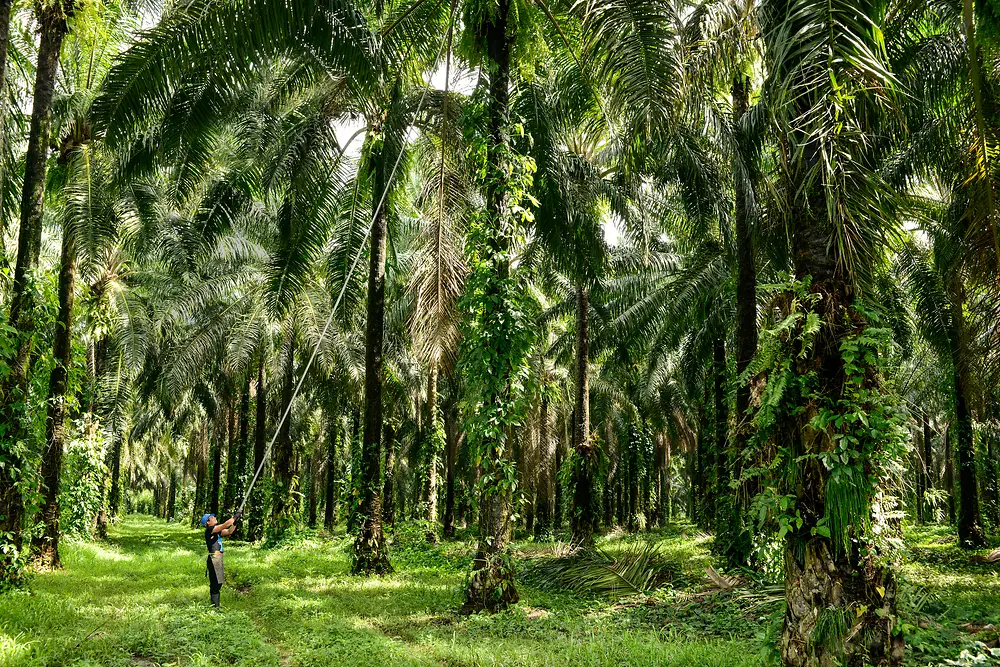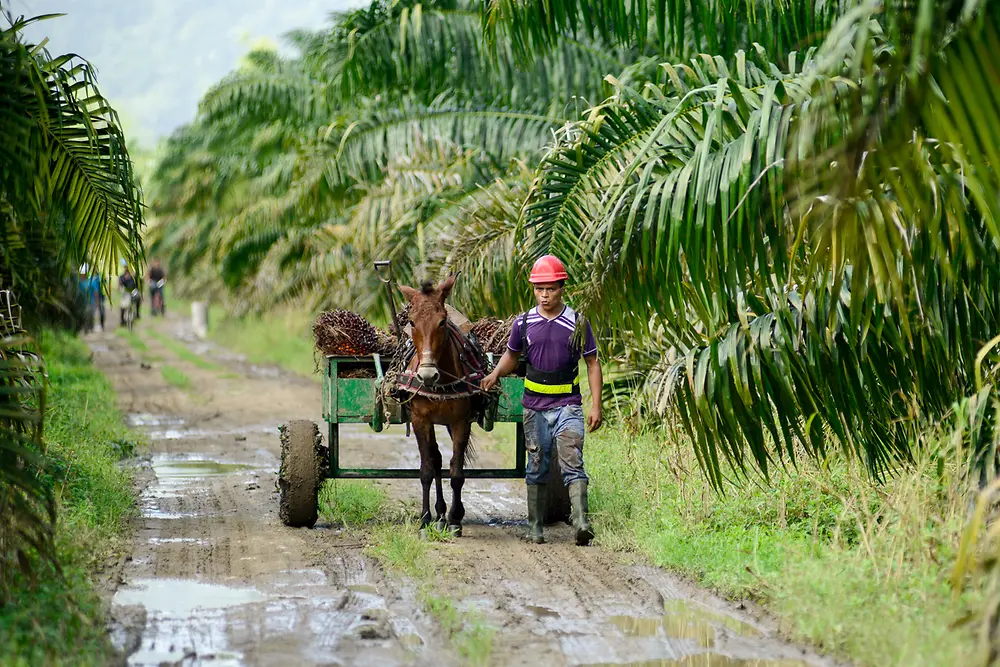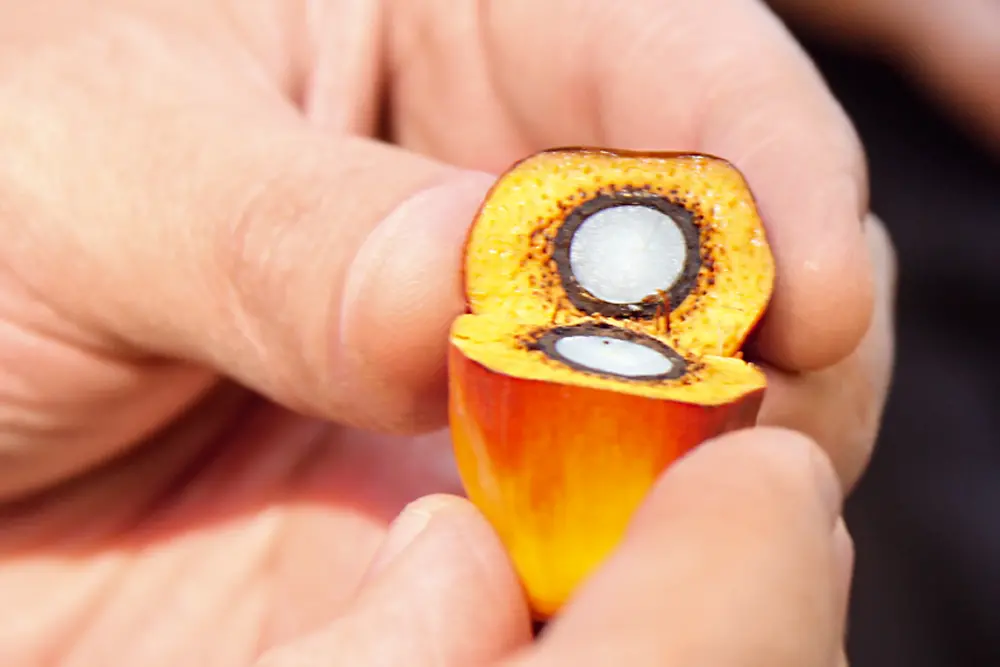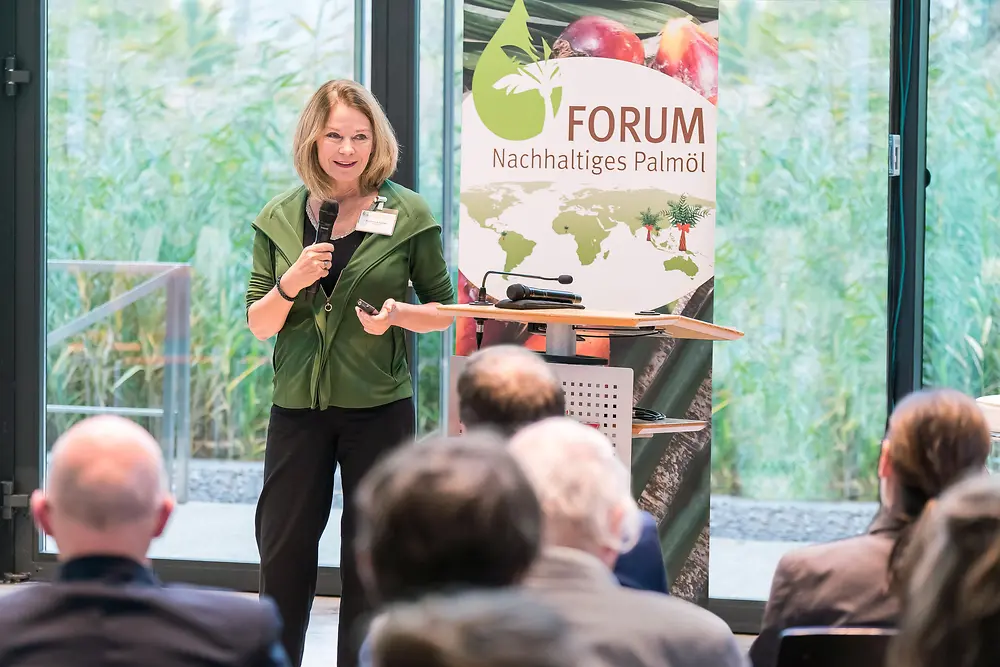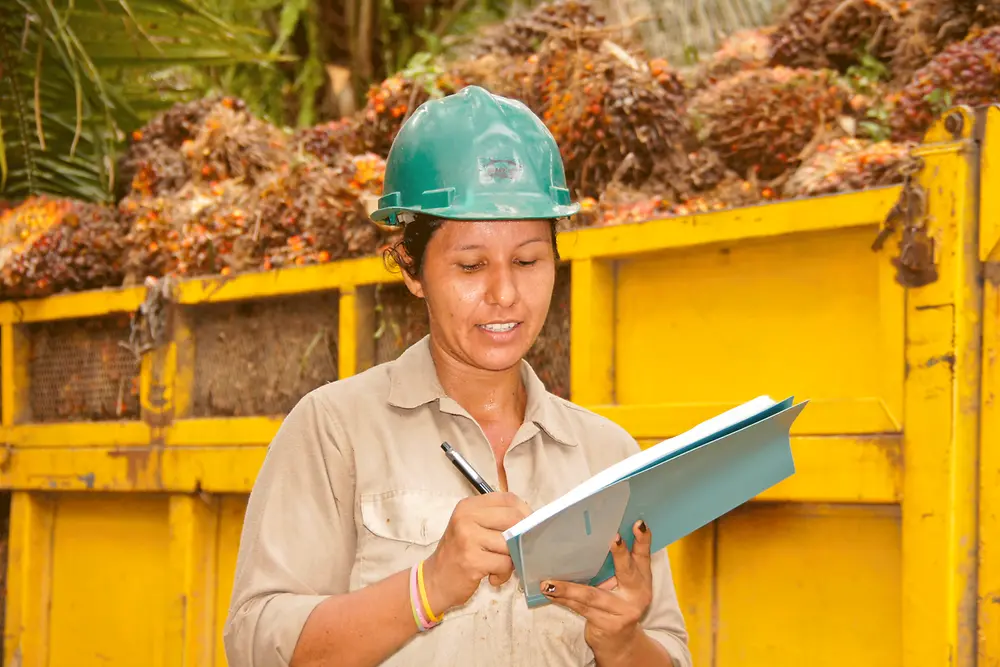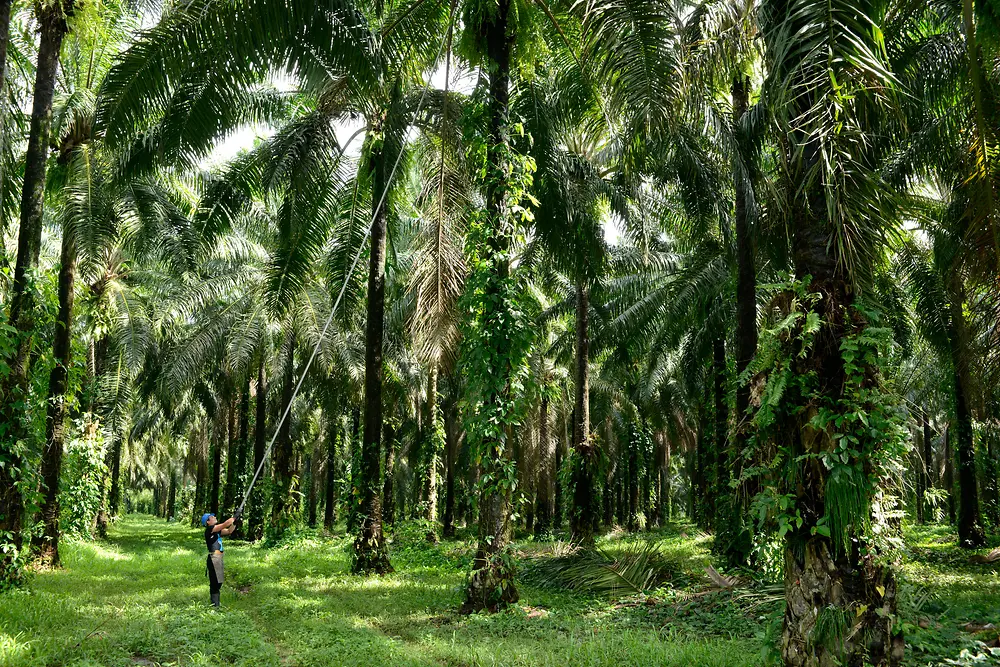Learn more about Henkel Brands & Businesses in UK & Irelands: Includes useful information about the brands, technologies and latest innovations in our business areas: Henkel Adhesive Technologies and Henkel Consumer Brands.
“It makes no sense to stop using palm oil”
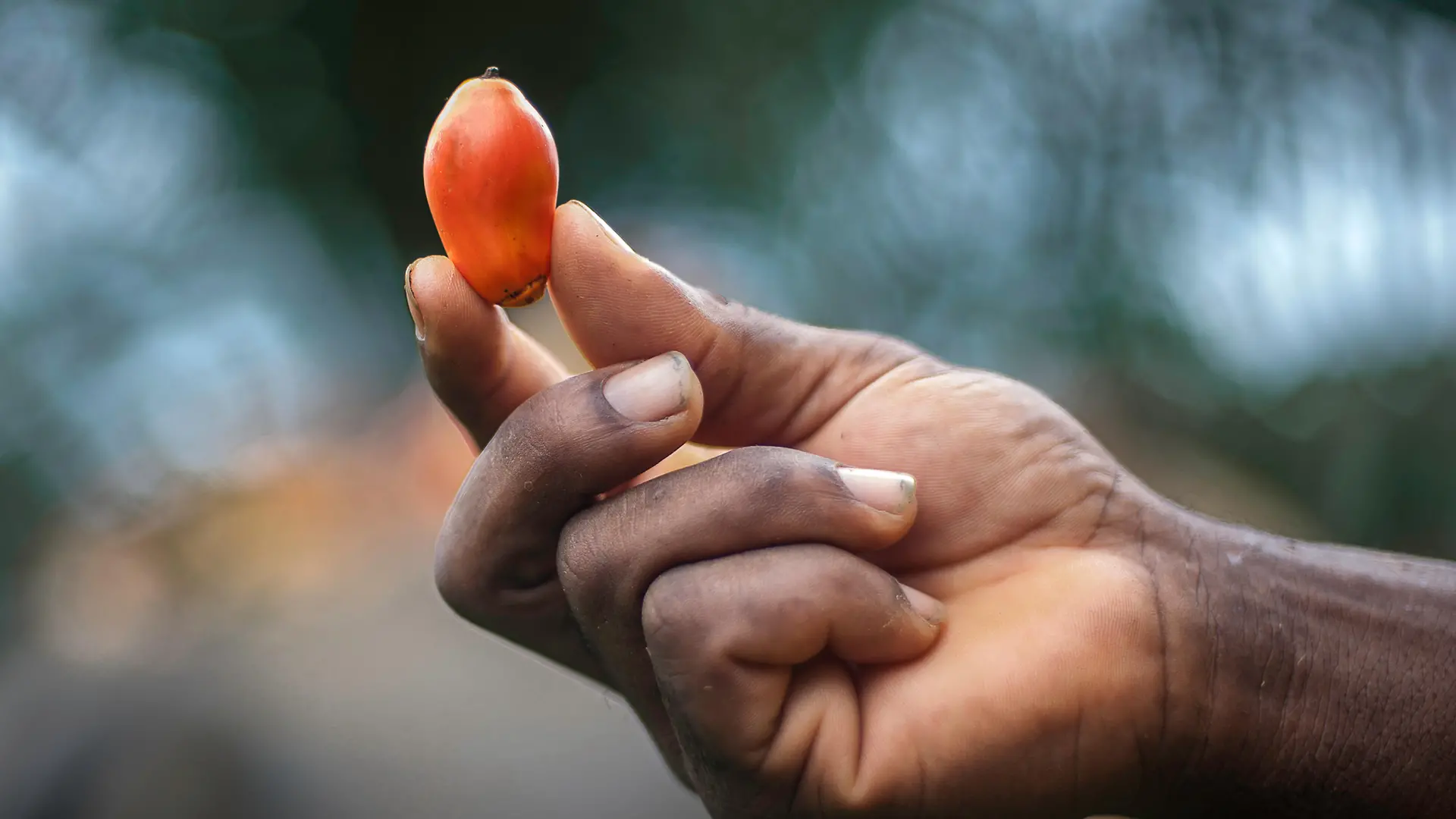
“Palm oil? No thanks!” is what many worried consumers currently think as they walk through the supermarket. The tropical oil is known for its bad reputation – but where does this actually originate from? Are there any benefits to not using palm oil? What does it mean when palm oil has been certified as sustainable? These are the questions we want to get to the bottom of in this interview with Moriz Vohrer, Managing Director of Solidaridad Deutschland, and Christine Schneider, responsible for the sustainability of product innovations for Laundry & Home Care at Henkel.
In recent years, an ever-increasing number of large palm oil plantations have been planted and cultivated to meet exceptionally high global demand. The effects of these mass plantations – especially with regards to the environment – are highly debated topics among environmental organizations, scientific circles and the general public. Is palm oil's bad reputation really justified?
Moriz Vohrer: Yes and no. The main reason for palm oil's image problem is the fact that it is grown on large plantations, which has contributed to deforestation and caused a huge loss of biodiversity. On the other hand, we must also consider that the human population has doubled in size over the last 40 to 50 years, so we have to produce more of what we need to live using less space. Palm oil is a fruit that provides about five times the oil of other oil-bearing plants such as rapeseed or sunflowers. This basically makes it a great fruit that we should use. Of course, we must now be extremely vigilant in ensuring that there is no further deforestation, and that palm oil is grown sustainably.
Does this mean that avoiding palm oil is not always the best solution?
Moriz Vohrer: Palm oil production also creates many jobs and, as a result, feeds many smallholder farmers and their families: Many thousands, if not millions, of people depend on income from the palm oil industry. However, everything we consume in this country today also has an impact elsewhere. Palm oil is a product that can only be grown in the tropics – often several thousand kilometers away. As a result, we may feel less responsibility than would be the case if the oil could be grown in our region. However, the world has become a village and we must also take responsibility for the people in other parts of the world. So, it makes no sense to completely stop using palm oil. Ecological and responsible cultivation is important: For example, if the palm oil has been certified by the “Roundtable on Sustainable Palm Oil” (RSPO), this means the needs of local people have been met in an acceptable and sustainable manner.

The world has become a village, and we must also take responsibility for the people in other parts of the world.
Moriz Vohrer, Managing Director of Solidaridad Germany
What is the difference between palm oil and palm kernel oil? What role do these raw materials play in the production of laundry detergents, household cleaners, body care products and cosmetics?
Christine Schneider: In addition to the positive properties mentioned above, palm oil also has many advantages for laundry detergents and household cleaners. The oil from the kernels is often used for these products – this accounts for around 10 percent of the harvest. 90 percent of the fruit is the pulp, which must be milled into palm oil within a very short time period – one day – as it spoils extremely quickly. The kernels, in turn, are first processed in a type of "crusher" before being chemically processed over several stages to provide us with the valuable ingredients for the surfactants. All products that foam contain surfactants; in this context, they are an almost irreplaceable raw material. The only alternative is coconut oil, but this is by no means as efficient or productive as palm kernel oil and, as yet, there is no certification system available for coconut plantations. For us, palm oil that has been certified as sustainable is therefore the best option.
What is the RSPO and why has it been criticized so often in the past?
Moriz Vohrer: The RSPO was initiated by the World Wildlife Fund (WWF) in 2004: The roundtable aims to facilitate collaboration between all of the stakeholders in the industry, such as non-governmental organizations (NGOs), companies, the scientific community and various other participants. Initially, the challenge was to find a common language and develop a mutual understanding as a basis for setting minimum standards and social and environmental criteria. This has taken seven years at the RSPO. Seven years to get the initial set of rules in place. The third version is now available, and many stakeholders are much more satisfied today. As I said, compromises had to be made initially so that the parties involved could reach common ground. However, this common ground has evolved over the years and become much larger.
The partnership between Solidaridad and Henkel has been in place for almost ten years. What are you working on together?
Christine Schneider: Establishing our partnership with Solidaridad in 2012 was an important milestone for us. As we know, 40 percent of the world's palm oil is produced by smallholder farmers. However, when it comes to certification, it's almost impossible for smallholders to meet the requirements and participate in the system. Since certified palm kernel oil is extremely scarce, we wanted to remedy this by increasing the yield of smallholders using their existing plantations and without increasing the amount of land used. We started in Honduras, and now we are active in many other countries in Latin America, as well as in Indonesia, Nigeria and Ghana. In 2013, we co-founded the Forum for Sustainable Palm Oil (FONAP), an organization that follows a similar approach to the RSPO but goes much further in terms of its demands. Meanwhile, two German federal ministries have also become members and contribute to the work of the forum – as strong advocates and partners, they can also cover the political aspects.
How does Solidaridad help smallholder farmers become certified producers?
Moriz Vohrer: What matters most to smallholders is what ends up in their pockets. Otherwise, they will not implement certain elements of sustainable cultivation. However, smallholder farmers often have limited knowledge of the most effective cultivation practices or access to capital that they can invest in improving their holdings. They also face the challenges associated with the growing demand for sustainably grown palm oil and its certification process. One of our goals is therefore to provide training to help them generate more yield, for example more oil per hectare, to help them increase their income. To achieve this, we support smallholders in meeting the required certification criteria, such as those stipulated by the RSPO. In addition to providing direct support to smallholders, by working with RSPO we are also committed to developing regulations that are geared toward small producers and large plantations alike.

Compromises have to be made and this can only happen if we talk to each other – helping hands are very important, I have learned that from Solidaridad.
Christine Schneider, responsible for sustainable product innovations for Laundry & Home Care at Henkel
Who assumes most of the responsibility for ensuring that palm oil is extracted in an environmentally and socially responsible way?
Christine Schneider: We have a very clear opinion on this: Companies need to implement and report on their goals. At the same time, responsibility also lies with domestic relations: Criteria must be checked and implemented locally. For example, slash and burn methods are still being used – despite being banned – due to insufficient monitoring. At FONAP, we therefore also speak to government representatives, local NGOs and plantation owners so we can understand the specific local situation and be informed about possible economic constraints. After all, as Moriz has said, compromises have to be made, and this can only happen if we talk to each other. As I have learned from Solidaridad, providing a helping hand is important here.
What contribution can consumers make to help ensure that your efforts are worthwhile?
Moriz Vohrer: I do not see consumers as having a major influence here. As we walk around the supermarket, we have about 2.8 seconds before we decide which product we are going to buy. In 2.8 seconds, it is unreasonable to acquire as much knowledge as we have, for example, and then to decide whether to buy one product or a different one. I personally think companies are responsible for ensuring these measures are successful. They could form an idea of what exactly they want to support – as Henkel is doing here, for example, with the support of Solidaridad. By engaging with this topic down to the last detail, they can then make an informed decision as to which strategies they want to pursue for which products. Due to palm oil's bad reputation, companies are often extremely reluctant to label products as containing RSPO-certified palm oil. A better solution would therefore be to see which manufacturer is involved and then take a look at the sustainability report: Companies use these to communicate how they are committed to sustainability, and over recent years the level of transparency in the reports has increased.




